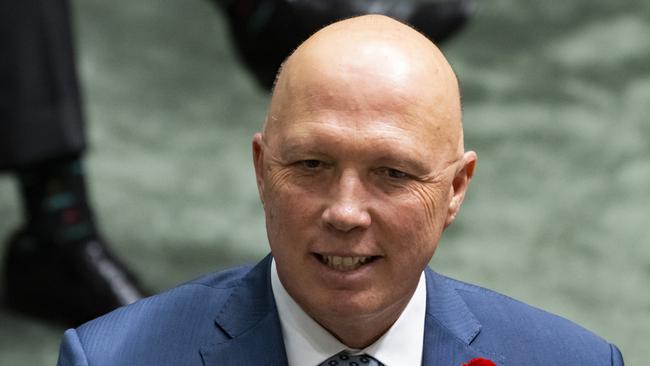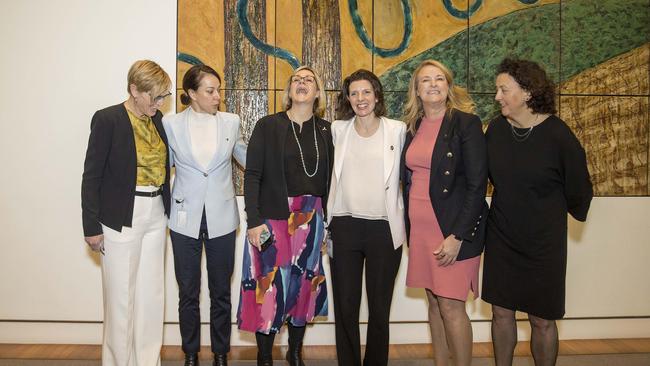Hex and the city: urban curse preys on Peter Dutton
The Liberal leader’s biggest challenge is positioning his party as a viable alternative government to the largest swathe of voters: those in metropolitan areas. That means taking on the teals.

We know from history how hard wars on two fronts are to win.
In the current parliament, the Coalition holds only 58 of the 151 house seats. For context, even Mark Latham’s disastrous performance at the 2004 election saw Labor retain 60 seats. The new Labor government has 77 seats, a majority but only just. That leaves 16 seats held by crossbenchers, most of which are former Coalition seats rather than Labor.
Remember that even going into the last election, most of the crossbench occupied former Coalition safe seats.
Peter Dutton has many challenges as the new opposition leader, not least of which is surviving to election day. The Liberals in opposition don’t retain the leadership rules that protect incumbents. In Dutton’s favour is a lack of clear alternatives (Sussan Ley aside), but that reality also works against the viability of his team as an alternative government.
Dutton will hope to retain the lion’s share of seats the conservatives still hold in Queensland, given he is a Queenslander. But so is the high-profile Treasurer Jim Chalmers, and while Labor didn’t win any seats in Queensland at the May election, it did cut into the margins in many – part of what it hopes will be a two-election strategy to wrestle back control of the sunshine state, something Labor achieved in one go in 2007 when Kevin Rudd beat John Howard.
Dutton has a two-term strategy of his own: using the next election to take away Labor’s majority, then bludgeoning a minority Labor government just like Tony Abbott did from 2010 to 2013. Of course, Dutton has to survive long enough to pull off such a strategy. He also needs to envelop the teals into such an approach.
If they throw their lot in with a minority Labor government after the next election, Dutton will use such positioning against them, in the hope of reclaiming the lost Liberal heartland. But that is no foregone conclusion. The teals have already shown themselves to be adroit at approaching political debates issue by issue. For example, they support the government on issues like climate change and an integrity commission, which they campaigned on. But for the most part they have been vocal critics of the new industrial relations laws, well aware that is the sentiment of their electorates.

Perhaps Dutton’s biggest challenge is positioning his party as a viable alternative government in the eyes of what constitutes the largest swathe of voters: those in metropolitan areas.
According to the Australian Electoral Commission, there are only 15 metropolitan Liberal MPs in the entire partyroom, leaving more Nationals (16) and a further 27 Liberals occupying regional and rural seats. Because the Liberals lost seats to both teals and Labor in metropolitan areas – and the Nationals retained all of their seats – the number of Coalition MPs representing metropolitan areas has plummeted to just 26 per cent in the joint partyroom.
This is significant because to win back the metropolitan electorates they lost, the Coalition can’t shy away from addressing its internal issues that rub up against the values of those who reside in such seats. Nor can it find itself beholden to policy scripts those in the regions and rural areas promote at the expense of the cities. The Liberals lost the following metropolitan seats to the teals: Wentworth, North Sydney, Mackellar, Curtin, Goldstein and Kooyong. They also lost Ryan and Brisbane to the Greens and Bennelong, Reid, Higgins, Boothby, Swan, Tangney, Pearce and Hasluck to Labor, all in metropolitan areas.
There has long been a group of rural and regional Liberal MPs who meet regularly to discuss how to ensure the non-city wing of the party doesn’t get ignored nor overshadowed by the Nationals. A worthwhile endeavour when they were outnumbered and outgunned. But because of the devastation wrought on metropolitan Liberals at this year’s election, a new group calling itself the “Metropolitan Members” (a lot of thought must have gone into the nomenclature) met for the first time on November 7 when parliament sat, and they will do so again next week.
The group’s first meeting was addressed by Dutton, himself a metropolitan MP, and discussed issues such as multiculturalism, economic rationalism and gender challenges that conservatives need to face up to. Ironically, there is only one woman among the 15 metropolitan MPs left within the opposition. Morrison was a notable absentee from the first meeting. It is unclear if he’ll bother to show up to the second.
It isn’t just the loss of ballast from the cities in the Coalition and Liberal partyrooms. Who was defeated in those seats is also cause for concern. Losing Josh Frydenberg is a huge blow to the calibre of the Liberal team. Further, moderate MPs were overwhelmingly shown the door by the teals, potentially driving what’s left of the Liberal Party further to the right.
In other metropolitan defeats, the Liberals lost what little diversity they had, with women, openly gay MPs, Ken Wyatt (Australia’s first Indigenous Indigenous affairs minister) and a brace of ministers either suffering defeat or retiring before they were beaten.
All of which has contributed to Dutton’s dilemma: leading a narrow second XI, while searching for the sort of talent Liberals need to win back electorates which can no longer be taken for granted. All of which has to be done at the same time as holding Labor to account in a difficult economic climate.
Whatever anyone thinks of Anthony Albanese, he has made a strong start in his first six months, both at home and abroad. He’s attempting to contrast his consensus style with both who came before him (Morrison) and who wants to come after him (Dutton). It remains to be seen if that will stay popular as the economic heat gets turned up, but even if Labor comes under pressure over the next two years, to take advantage of such circumstances, the Liberals need to get their own house in order. That’s before you even consider tensions with the Nationals.
We know from history that the Coalition relationship in opposition gets tested. The only reason history might not repeat itself on that front is because the metropolitan Liberals have lost authority, leaving the Nationals more satisfied with policy outcomes they collude on with regional and rural Liberals.
Such a possibility might be a recipe for internal harmony within the Coalition, but it would come at the expense of electoral outcomes in the cities, the only pathway to victory. And it assumes metropolitan Liberals will stay silent as they get ignored. The setting up of the Metropolitan Members suggests otherwise.
Peter van Onselen is professor of politics and public policy at The University of Western Australia and Griffith University.




As you would expect, a multitude of factors contributed to the Coalition’s defeat six months ago: a sound Labor strategy; the unpopularity of Scott Morrison (a biggie); a lack of depth within the government; the zeitgeist coupled with poor gender representation in Coalition ranks. But undoubtedly one of the most powerful factors that helped bring down the former Coalition government was the fact it fought a war on two fronts, which was symptomatic of much of the above: attempting to stave off Labor in key marginal seats and the teals in traditionally safe Liberal electorates.